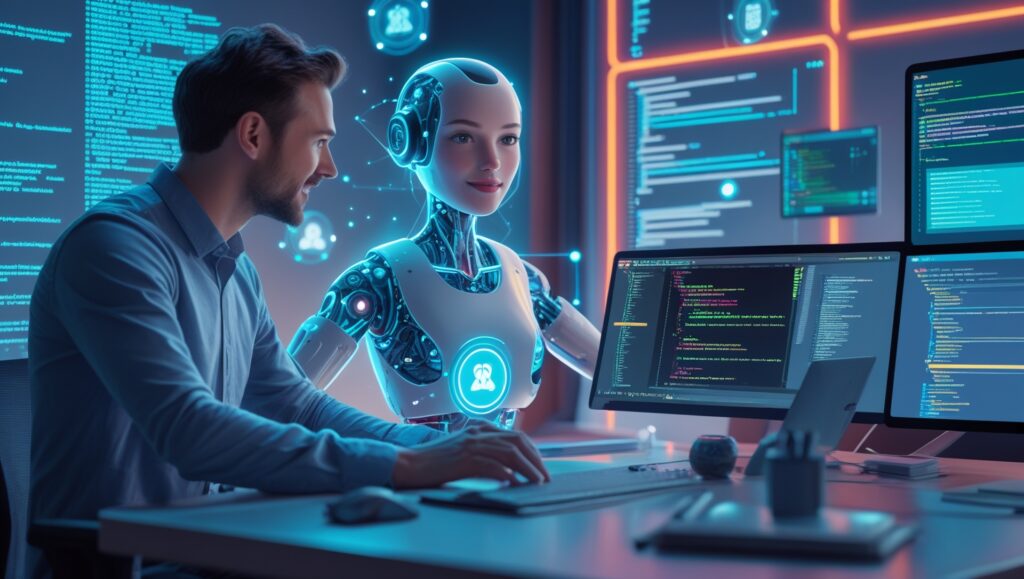Discover how AI-Powered software development is revolutionizing coding in 2025. Learn how autonomous coding tools, AI copilots, and automation are shaping the future of programming.
Table of Contents
Introduction: A New Era of Software Development
In 2025, we’re witnessing a big shift in how software is created. Traditional coding—done line by line by human developers—is being transformed by Artificial Intelligence (AI). Today, AI can not only help you write code, but also test it, deploy it, and even manage updates.

This transformation is called AI-powered software development, and it’s becoming the new standard for startups, enterprises, and solo developers alike.
In this blog post, we’ll explain:
- What AI-powered software development means
- How it works
- The tools and technologies behind it
- Real-world examples
- Benefits and challenges
- What the future holds
What is AI-Powered Software Development?
AI-powered software development is the use of machine learning models, natural language processing (NLP), and automation to help developers build software faster, with fewer errors.
In simple terms, AI is now acting like a coding assistant—or even a co-developer.
Some common tasks AI handles:
- Writing code from simple text prompts
- Detecting bugs before testing
- Suggesting code improvements
- Generating unit and integration tests
- Automating software deployment (DevOps)
How AI-Powered is Works (In Simple Words)
Let’s say you want to build a weather app.
Traditional way:
- You write the code manually in Python or JavaScript.
- You set up the database.
- You write tests to check if your code works.
- You deploy the app using services like AWS or Azure.
With AI:
- You describe the app in simple English: “Build a mobile app that shows current weather using GPS.”
- AI tools (like GitHub Copilot, Google Gemini, or Amazon CodeWhisperer) generate most of the code.
- AI sets up the project structure, adds API integration, and even writes unit tests.
- An AI-based DevOps tool like AutoGPT deploys the app for you.
In minutes, you have a working prototype!
Top AI Tools Used in 2025 for Software Development
Here are some popular tools powering this revolution:
| Tool Name | What It Does |
| GitHub Copilot X | Autocompletes code, writes functions & comments |
| Amazon CodeWhisperer | Suggests code snippets in real-time |
| Cursor | AI-powered IDE for full-stack projects |
| Tabnine | Context-aware AI code suggestions |
| SuperAGI | Agent-based coding automation |
| AutoGPT / Dev-GPT | AI agents for building, testing, deploying apps |
| GPT-4 Turbo / Claude 3 | Interprets prompts and generates entire apps |
Examples of AI-Powered in Action
1. Building a To-Do List App
You type:
“Create a simple to-do list app using React with add, delete, and mark as complete functions.”
AI tool response:
- Sets up the React project
- Generates the frontend UI with buttons
- Adds functions for adding/removing tasks
- Suggests CSS styling
- Deploys it to Vercel in one click
2. Bug Detection in Legacy Code
Upload a large codebase written years ago.
AI scans the code and points out:
- Deprecated functions
- Security vulnerabilities
- Logic errors
It then offers fixes with explanations.
Benefits of AI-Powered Development
✅ Speed
AI helps write code 3–5 times faster by reducing boilerplate work.
✅ Fewer Bugs
AI tools catch bugs before code is run.
✅ Better Code Quality
Modern AI understands best practices and suggests optimized code.
✅ Cost-Effective
You need fewer developers for MVPs (Minimum Viable Products), saving startups money.
✅ Increased Productivity
AI handles repetitive tasks so human developers can focus on core logic and innovation.
Challenges and Concerns
Despite its benefits, there are some challenges:
⚠️ Lack of Context
AI may not fully understand business logic or complex legacy systems.
⚠️ Security Risks
Auto-generated code may contain hidden vulnerabilities.
⚠️ Over-Reliance
Junior developers may become too dependent on AI and skip learning basics.
⚠️ Ethical Questions
Who owns AI-generated code? Is it plagiarism? These questions still need legal clarity.
Use Cases Across Industries
🏥 Healthcare
AI helps create software for patient monitoring, scheduling, and medical records.
🛍 E-commerce
AI-powered sites recommend products, handle inventory, and manage CRM.
💼 Enterprise IT
Large companies use AI for code refactoring, automation bots, and DevOps workflows.
📱 Startups
Founders can build and launch MVPs with very little initial coding knowledge.
2025 Trends in AI Software Development
1. Agentic AI Systems
AI agents (like AutoGPT or SuperAGI) can complete full tasks like:
“Build and deploy a blog site using Next.js and connect it to a CMS.”
2. Prompt-Driven Coding
You write prompts like “Build a food delivery app,” and AI takes care of the rest.
3. AI in DevOps
From continuous integration (CI/CD) to automated testing, AI is making DevOps faster and smarter.
4. Explainable AI Code
New tools not only write code but also explain what the code does, helping developers learn.
Most Asked Questions
1. What is AI-powered software development?
AI-powered software development is the use of artificial intelligence tools and algorithms to assist or automate parts of the software creation process, such as coding, testing, debugging, and deployment.
2. How is AI used in software development in 2025?
AI is used for code generation, auto-completion, bug detection, test case creation, infrastructure automation, and even autonomous agent-based development.
3. Which AI tools are best for software developers in 2025?
Popular tools include:
- GitHub Copilot X
- Amazon CodeWhisperer
- Google Gemini Code Assist
- Cursor IDE
- AutoGPT
- Tabnine
4. Can AI write complete software applications?
Yes, in many cases. With prompt-based input, AI can now build full-stack applications, generate frontend/backend code, connect APIs, and even deploy the product.
5. Is AI replacing human software developers?
Not completely. AI is augmenting developer capabilities. Developers now guide, review, and collaborate with AI to build software more efficiently.
6. What are AI coding agents or autonomous agents?
These are advanced AI systems (like AutoGPT or SuperAGI) that can plan, code, test, and deploy software without constant human input.
7. How accurate is AI-generated code?
AI code is generally accurate for standard patterns but may require human review for logic correctness, security, and business context.
8. Is AI-generated code safe and secure?
Not always. Developers should always validate AI-generated code, especially in critical systems, to avoid security vulnerabilities or logic errors.
9. What is prompt engineering in software development?
Prompt engineering is the practice of writing clear instructions to guide AI tools in generating specific code outputs or actions.
10. Can non-developers use AI to build apps?
Yes. With tools like Replit AI, GPT-4 Turbo, and Webflow AI, non-coders can build basic apps, websites, and workflows with natural language prompts.
11. How do I start using AI for coding?
Start by exploring:
- GitHub Copilot (in VS Code or JetBrains)
- Cursor IDE
- ChatGPT or Gemini for code snippets
- Replit’s AI for full projects
12. What are the benefits of AI in software development?
- Faster development
- Fewer bugs
- More automation
- Increased productivity
- Lower development costs
13. What are the risks of using AI in coding?
- Over-reliance
- Lack of understanding of the code
- Security flaws
- Inaccurate business logic
14. What programming languages work best with AI tools?
AI tools support almost all major languages, including:
- Python
- JavaScript
- Java
- C++
- TypeScript
- Go
- Rust
15. What’s the future of AI in software development?
The future includes more autonomous AI agents, better natural language interfaces, improved testing and debugging capabilities, and human-AI collaboration for complex projects.

